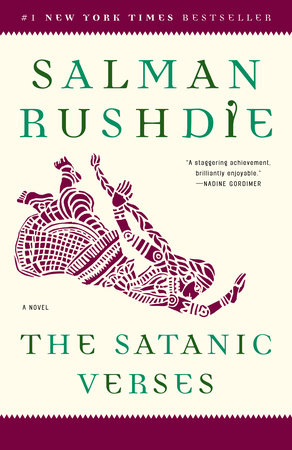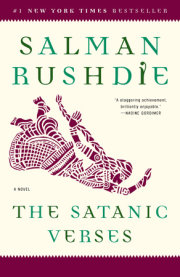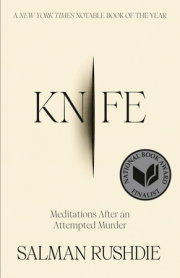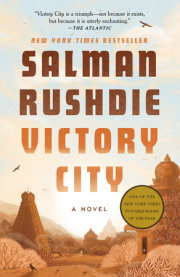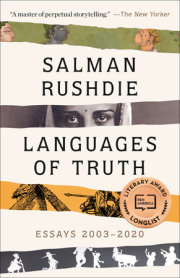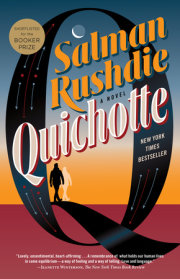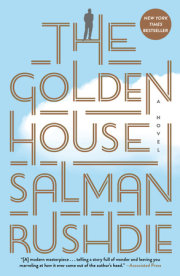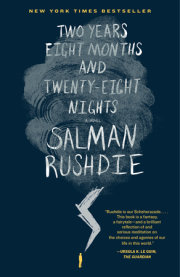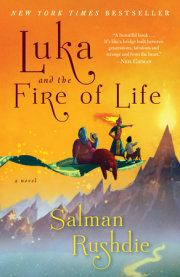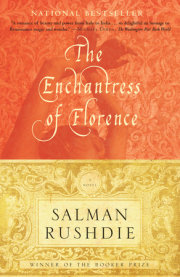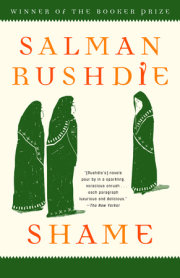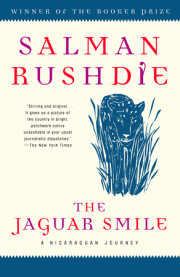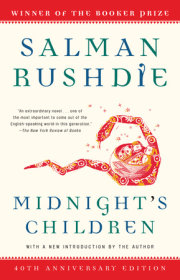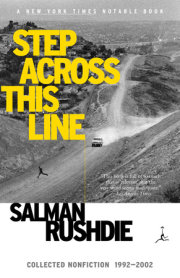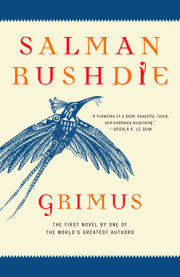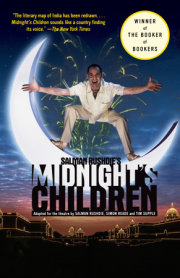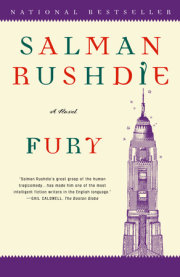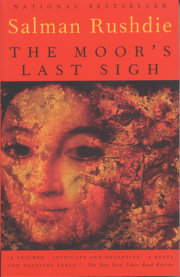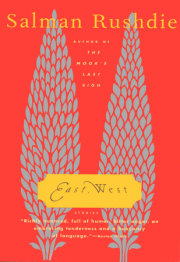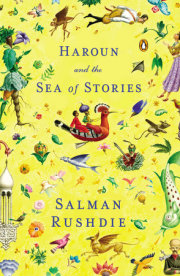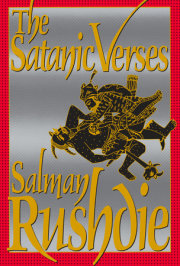1
‘To be born again,’ sang Gibreel Farishta tumbling from the heavens, ‘first you have to die. Ho ji! Ho ji! To land upon the bosomy earth, first one needs to fly. Tat-taa! Taka-thun! How to ever smile again, if first you won’t cry? How to win the darling’s love, mister, without a sigh? Baba, if you want to get born again …’ Just before dawn one winter’s morning, New Year’s Day or thereabouts, two real, full-grown, living men fell from a great height, twenty-nine thousand and two feet, towards the English Channel, without benefit of parachutes or wings, out of a clear sky.
‘I tell you, you must die, I tell you, I tell you,’ and thusly and so beneath a moon of alabaster until a loud cry crossed the night, ‘To the devil with your tunes,’ the words hanging crystalline in the iced white night, ‘in the movies you only mimed to playback singers, so spare me these infernal noises now.”
Gibreel, the tuneless soloist, had been cavorting in moonlight as he sang his impromptu gazal, swimming in air, butterfly-stroke, breast-stroke, bunching himself into a ball, spreadeagling himself against the almost-infinity of the almost-dawn, adopting heraldic postures, rampant, couchant, pitting levity against gravity. Now he rolled happily towards the sardonic voice. ‘Ohé, Salad baba, it’s you, too good. What-ho, old Chumch.’ At which the other, a fastidious shadow falling headfirst in a grey suit with all the jacket buttons done up, arms by his sides, taking for granted the improbability of the bowler hat on his head, pulled a nickname-hater’s face. ‘Hey, Spoono,’ Gibreel yelled, eliciting a second inverted wince, ‘Proper London, bhai! Here we come! Those bastards own there won’t know what hit them. Meteor or lightning or vengeance of God. Out of thin air, baby. Dharrraaammm! Wham, na? What an entrance, yaar. I swear: splat.’
Out of thin air: a big bang, followed by falling stars. A universal beginning, a miniature echo of the birth of time … the jumbo jet Bostan, Flight AI-420, blew apart without any warning, high above the great, rotting, beautiful, snow-white, illuminated city, Mahagonny, Babylon, Alphaville. But Gibreel has already named it, I mustn’t interfere: Proper London, capital of Vilayet, winked blinked nodded in the night. While at Himalayan height a brief and premature sun burst into the powdery January air, a blip vanished from radar screens, and the thin air was full of bodies, descending from the Everest of the catastrophe to the milky paleness of the sea.
Who am I?
Who else is there?
The aircraft cracked in half, a seed-pod giving up its spores, an egg yielding its mystery. Two actors, prancing Gibreel and buttony, pursed Mr Saladin Chamcha, fell like titbits of tobacco from a broken old cigar. Above, behind, below them in the void there hung reclining seats, stereophonic headsets, drinks trolleys, motion discomfort receptacles, disembarkation cards, duty-free video games, braided caps, paper cups, blankets, oxygen masks. Also – for there had been more than a few migrants aboard, yes, quite a quantity of wives who had been grilled by reasonable, doing-their-job officials about the length of and distinguishing moles upon their husbands’ genitalia, a sufficiency of children upon whose legitimacy the British Government had cast its ever-reasonable doubts – mingling with the remnants of the plane, equally fragmented, equally absurd, there floated the debris of the soul, broken memories, sloughed-off selves, severed mother-tongues, violated privacies, untranslatable jokes, extinguished futures, lost loves, the forgotten meaning of hollow, booming words, land, belonging, home. Knocked a little silly by the blast, Gibreel and Saladin plummeted like bundles dropped by some carelessly open-beaked stork, and because Chamcha was going down head first, in the recommended position for babies entering the birth canal, he commenced to feel a low irritation at the other’s refusal to fall in plain fashion. Saladin nosedived while Farishta embraced air, hugging it with his arms and legs, a flailing, overwrought actor without techniques of restraint. Below, cloud-covered, awaiting their entrance, the slow congealed currents of the English Sleeve, the appointed zone of their watery reincarnation.
“O, my shoes are Japanese,’ Gibreel sang, translating the old song into English in semi-conscious deference to the uprushing host-nation, ‘These trousers English, if you please. On my head, red Russian hat; my heart’s Indian for all that.’ The clouds were bubbling up towards them, and perhaps it was on account of that great mystification of cumulus and cumulo-nimbus, the mighty rolling thunderheads standing like hammers in the dawn, or perhaps it was the singing (the one busy performing, the other booing the performance), or their blast-delirium that spared them full foreknowledge of the imminent … but for whatever reason, the two men, Gibreelsaladin Farishtachamcha, condemned to this endless but also ending angelicdevilish fall, did not become aware of the moment at which the processes of their transmutation began.
Mutation?
Yessir, but not random. Up there in air-space, in that soft, imperceptible field which had been made possible by the century and which, thereafter, made the century possible, becoming one of its defining locations, the place of movement and of war, the planet-shrinker and power-vacuum, most insecure and transitory of zones, illusory, discontinuous, metamorphic, – because when you throw everything up in the air anything becomes possible – wayupthere, at any rate, changes took place in delirious actors that would have gladdened the heart of old Mr Lamarck: under extreme environmental pressure, characteristics were acquired.
What characteristics which? Slow down; you think Creation happens in a rush? So then, neither does revelation … take a look at the pair of them. Notice anything unusual? Just two brown men, falling hard, nothing so new about that, you may think; climbed too high, got above themselves, flew too close to the sun, is that it?
That’s not it. Listen:
Mr Saladin Chamcha, appalled by the noises emanating from Gibreel Farishta’s mouth, fought back with verses of his own. What Farishta heard wafting across the improbable night sky was an old song, too, lyrics by Mr James Thomson, seventeen-hundred to seventeen-forty-eight. ‘ … at Heaven’s command,’ Chamcha carolled through lips turned jingoistically redwhiteblue by the cold, ‘arooooose from out the aaaazure main.’ Farishta, horrified, sang louder and louder of Japanese shoes, Russian hats, inviolately subcontinental hearts, but could not still Saladin’s wild recital: ‘And guardian aaaaangels sung the strain.’
Let’s face it: it was impossible for them to have heard one another, much less conversed and also competed thus in song. Accelerating towards the planet, atmosphere roaring around them, how could they? But let’s face this, too: they did.
Downdown they hurtled, and the winter cold frosting their eyelashes and threatening to freeze their hearts was on the point of waking them from their delirious daydream, they were about to become aware of the miracle of the singing, the rain of limbs and babies of which they were a part, and the terror of the destiny rushing at them from below, when they hit, were drenched and instantly iced by, the degree-zero boiling of the clouds.
They were in what appeared to be a long, vertical tunnel. Chamcha, prim, rigid, and still upside-down, saw Gibreel Farishta in his purple bush-shirt come swimming towards him across that cloud-walled funnel, and would have shouted, ‘Keep away, get away from me,’ except that something prevented him, the beginning of a little fluttery screamy thing in his intestines, so instead of uttering words of rejection he opened his arms and Farishta swam into them until they were embracing head-to-tail, and the force of their collision sent them tumbling end over end, performing their geminate cartwheels all the way down and along the hole that went to Wonderland; while pushing their way out of the white came a succession of cloudforms, ceaselessly metamorphosing, gods into bulls, women into spiders, men into wolves. Hybrid cloud-creatures pressed in upon them, gigantic flowers with human breasts dangling from fleshy stalks, winged cats, centaurs, and Chamcha in his semi-consciousness was seized by the notion that he, too, had acquired the quality of cloudiness, becoming metamorphic, hybrid, as if he were growing into the person whose head nestled now between his legs and whose legs were wrapped around his long, patrician neck.
This person had, however, no time for such ‘high falutions’; was, indeed, incapable of faluting at all; having just seen, emerging from the swirl of cloud, the figure of a glamorous woman of a certain age, wearing a brocade sari in green and gold, with a diamond in her nose and lacquer defending her high-coiled hair against the pressure of the wind at these altitudes, as she sat, equably, upon a flying carpet. ‘Rekha Merchant,’ Gibreel greeted her. ‘You couldn’t find your way to heaven or what?’ Insensitive words to speak to a dead woman! But his concussed, plummeting condition may be offered in mitigation … Chamcha, clutching his legs, made an uncomprehending query: ‘What the hell?’
‘You don’t see her?’ Gibreel shouted. ‘You don’t see her goddamn Bokhara rug?’
No, no, Gibbo, her voice whispered in his ears, don’t expect him to confirm. I am strictly for your eyes only, maybe you are going crazy, what do you think, you namaqool, you piece of pig excrement, my love. With death comes honesty, my beloved, so I can call you by your true names.
Cloudy Rekha murmured sour nothings, but Gibreel cried again to Chamcha: ‘Spoono? You see her or you don’t?’
Saladin Chamcha saw nothing, heard nothing, said nothing. Gibreel faced her alone. ‘You shouldn’t have done it,’ he admonished her. ‘No, sir. A sin. A suchmuch thing.”
Copyright © 2011 by Salman Rushdie. All rights reserved. No part of this excerpt may be reproduced or reprinted without permission in writing from the publisher.

